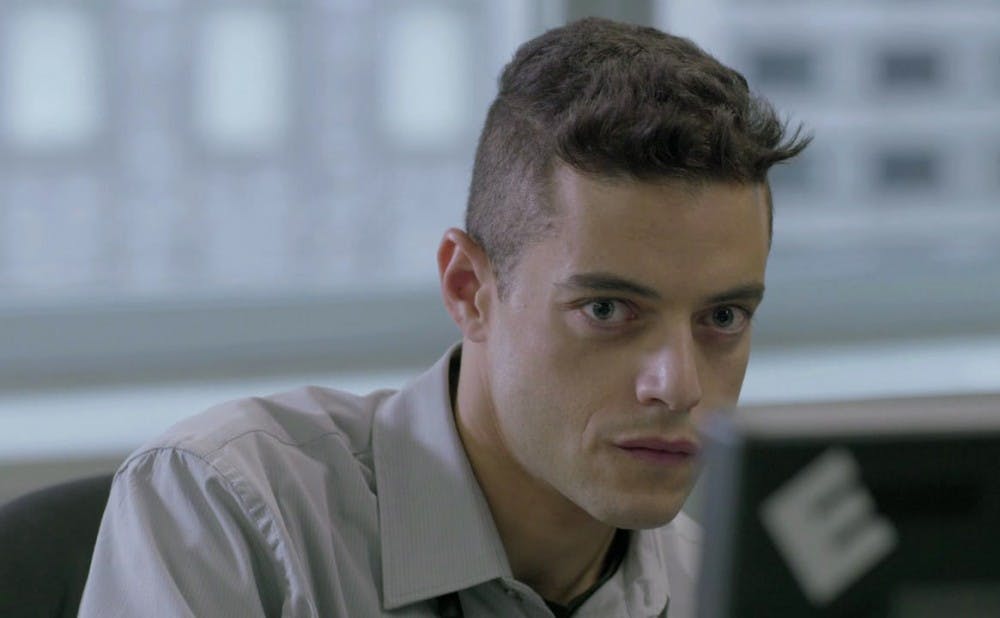You might be wondering whether television drama has been having an identity crisis over the past few years or if society is just becoming increasingly entertained with dark, bleak cynicism. It is pretty odd that viewers are tuning into this new genre of humorlessness and tragedy, such as in "The Walking Dead," "Game of Thrones" or True Detective, over comedy and sitcoms. Why are we tuning into social unrest, political dissatisfaction and grim bleakness over canned laughter, predictable endings and cliché story lines that could leave us with instantaneous pleasure instead of general discontentment?
The Golden Globe for Best TV Series in 2016, "Mr. Robot," which stole our hearts and our time, is no different. It is clear that viewers like myself fell in love with Rami Malek's eerily captivating portrayal of Elliot, a schizophrenic cyber hacker that attempts to bring down corporations, capitalism and government surveillance from behind his computer screen. Working as a computer programmer at a cybersecurity firm by day and trying to overthrow the firm as a vigilante hacker at night, Elliot means well by turning over child pornography pedophiles and unfaithful spouses from Ashley Madison to the police through his searches. Yet Elliot captures the essence of a true anti hero - grappling with morphine addiction and social discomfort, in the process of trying to reveal the bad guys, fix the global economy and redistribute the top one percent’s wealth—all from behind his computer.
Breaking through the "fourth wall" to speak directly to the audience, Elliot shares an introspective look into his mental fragility and his inherent disconnect from others. He prefers to interact with people by hacking into their social media and email accounts to understand who they are, and while this may be slightly pitiful and creepy, it demonstrates Elliot’s desire for intimacy and his convoluted way of gaining insight. The psychologically troubled antihero is constantly against the "trappings of modernity" but remains infuriated with everything he feels excluded from, leaving him feeling isolated and alone.
Elliot frequently shares monologues about his disillusionment with society, asking questions such as why “we collectively thought Steve Jobs was a great man, even when we knew he made billions off the backs of children? Or maybe it’s that it feels like all our heroes are counterfeit. The world itself’s just one big hoax. Spamming each other with our running commentary of bulls**t masquerading as insight, our social media faking as intimacy. Or is it that we voted for this? Not with our rigged elections, but with our things, our property, our money. I’m not saying anything new, we all know why we do this, not because "Hunger Games" books makes us happy but because we wanna be sedated. Because it’s painful not to pretend, because we’re cowards. F*** society”
And while we are more likely to pity Elliot than idolize him, the audience can all inevitably find mutual understanding with him and his authentic moral concerns, seeking to connect beyond social media and recognizing our world built on fantasy — brainwashed by “our synthetic emotions in the form of pills, psychological warfare in the form of advertising and mind-altering chemicals in the form of… food!”
So no, we might not have social anxiety disorder, schizophrenic hallucinations or be a paranoid recluse like Elliot, but it is obvious that we all can relate to his criticism of mainstream society and disenfranchisement with conformity.
So why do we love this show so much?
Our love of "Mr. Robot" reflects America’s current climate – we’re unhappy and we want change. Maybe we love this show because no matter where we fall on social or political issues, it is clear we live in a very divisive time, in an election year where it feels like there’s no middle ground in sight and we have no control over our fate, yet Mr. Robot fantasizes the possibility of rebellion amongst such economic and political turmoil.
Glorifying anarchy and deconstructing civilization at a time where it feels like we have no control makes "Mr. Robot" irresistibly addicting and inherently authentic. "Mr. Robot" is essentially a show about societal discomfort and panic, examining what the world would be like if there was a global economic collapse.
And while "Mr. Robot’s" dystopia exacerbates global inequality and our current reality, it is undeniable that there are underlying truths behind Evil Corp’s depiction of corporate America and where our future lies if we continue down this dark, polarized direction.
However, as much as we associate with Elliot or other tortured anti heroes, such as Walter White ("Breaking Bad"), Don Draper ("Mad Men") or Frank Underwood ("House of Cards"), it is important to cautiously identify with such a cynical and bleak characters. What we watch influences how we think and act, perpetuating like minded behaviors. So as much as we empathize with Elliot and his inability to “see those stupid Marvel movies...join a gym..heart things on Instagram and drink vanilla lattes,” his cynicism reinforces his isolating nature, perhaps leading us to create a similar environment.
So while canned laughter on sitcoms makes me queasy, maybe it isn’t the worst thing to tune into shows like "Friends" or "How I Met Your Mother," every so often, just to be reminded of living in a world with predictably happy endings; where the bad guys get caught and we are left with the capacity to be optimistic, rather than ruminating in our cynical, bleak pessimism.
Get The Chronicle straight to your inbox
Signup for our weekly newsletter. Cancel at any time.

